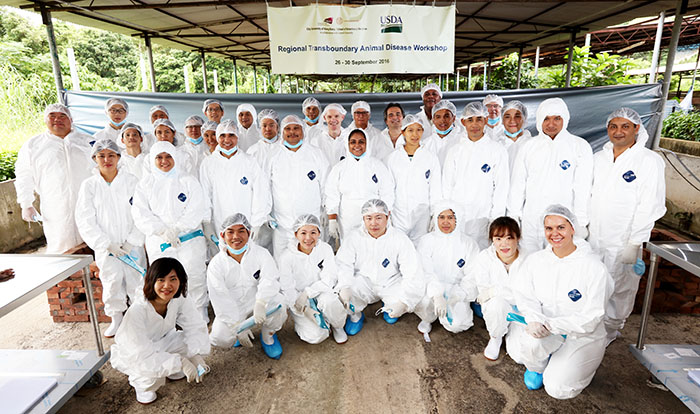
Over 30 veterinarians from 14 South-east Asian countries participated in the five-day course on International Transboundary Animal Disease(ITAD) jointly hosted by the United States Department of Agriculture (USDA) and CityU’s College of Veterinary Medicine and Life Sciences from 26 – 30 September 2016. This was the first time such a course has been held in this region.
The ITAD course aimed at introducing participants to the major emerging transboundary animal diseases that impact the trade of animals and animal products worldwide whilst enhancing their understanding through hands-on workshops and engaging discussions.

The course was led by two former Chief Veterinary Officers of the United States, Dr Alfonso Torres and Dr Peter Fernandez who shared with the participants the latest development of the various kinds of ITAD diseases through lectures, discussions, and hands-on sessions. Emerging animal diseases covered in the course included Avian Influenza, Foot and Mouth Disease, African Horse Sickness, Classical Swine Fever and more. The impact on global economies and food security and safety were highlighted.

We were honoured to have Professor Malik Peiris of the University of Hong Kong, Dr Chris Riggs and Dr. Peter Curl from the Hong Kong Jockey Club and Mr M.W. Lee from the Food and Environmental Hygiene Department for giving talks on SARS and MERS, the international movement of horses and animal health and mosquito-borne diseases respectively.

The participants, comprised veterinarians from Cambodia, Pakistan, India, Indonesia, Malaysia, Mongolia, among others, were also actively engaged in the discussion on animal diseases of particular importance in this region and their countries of origins as a way to share experience.
Another highlight of the course was three half-day sessions of post mortem examination of pigs, chickens and horses. Dr. Torres and Dr Fernandez conducted a thorough demonstration and the in-depth exchanges among the speakers and participants help promote a greater understanding of ITAD across countries and hence, fight against the prevention and control of infectious animal diseases.
